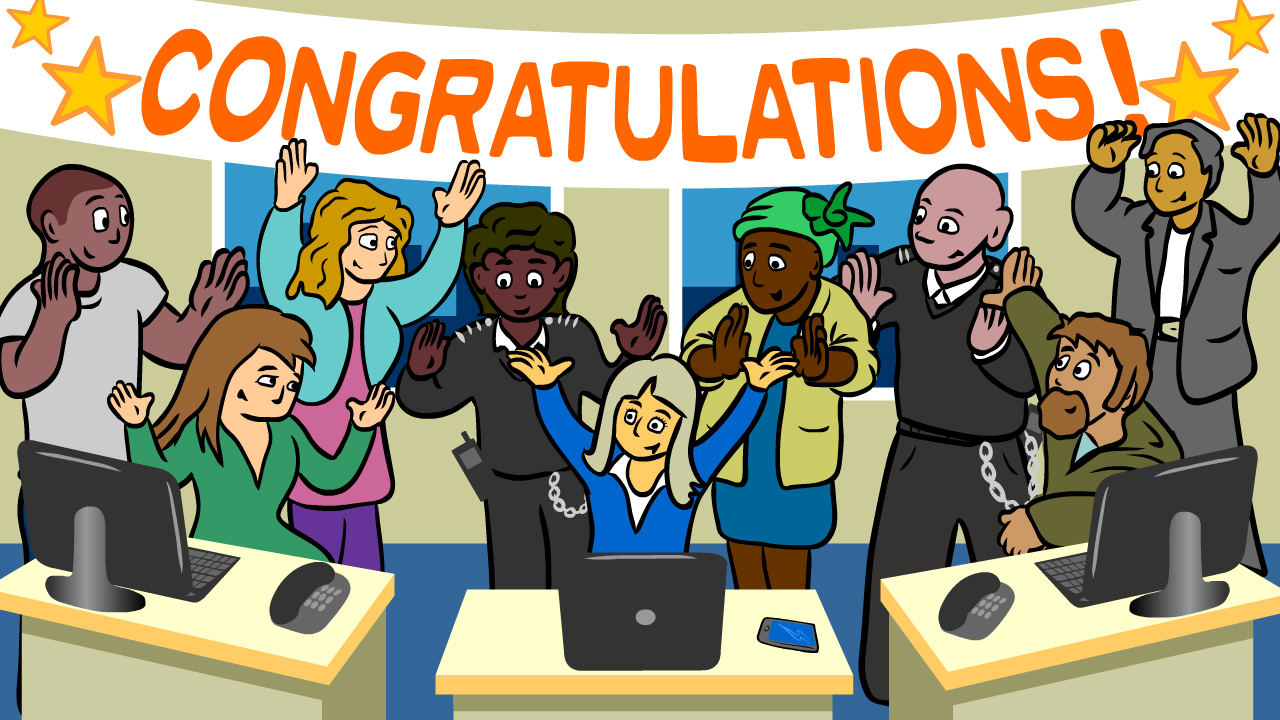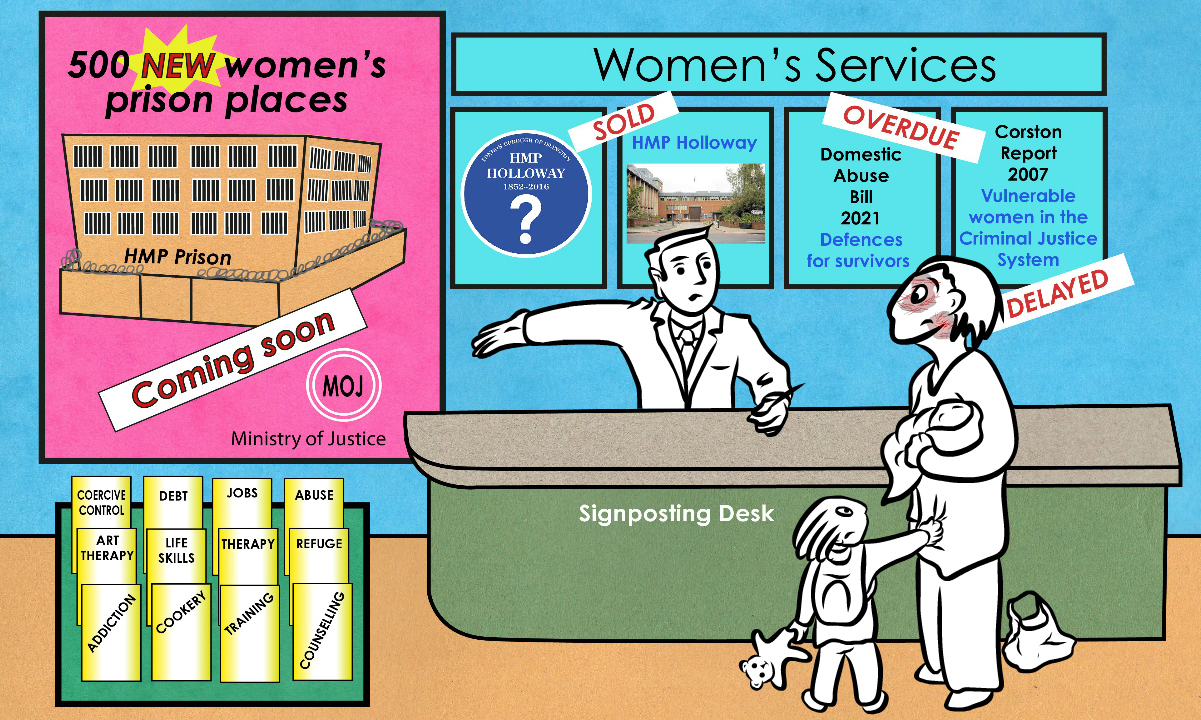
Illustration from the the PET animation celebrating learners’ success, created by Erika
Artist Erika Flowers was funded by PET to study OCA’s The Practice of Painting course in 2015 – the first unit of her BA Hons in Visual Arts.
Since leaving prison she’s been part of the PET Alumni Advisory Group, helping us improve the work that we do. She spoke to Head of Service Delivery Clare Lloyd about her work with the group.
Why did you decide to join the group back in 2017?
At the time I was feeling very vulnerable. I’d just come out of prison, I had no money and no way of looking for work, and while staying with friends I couldn’t even sign on for three months until I had got my home back.
I had started to go to a few things run by charities working in the criminal justice system, like the National Criminal Justice Arts Alliance and Koestler.
I was invited by PET to come and see how the group worked. Coming to those first meetings, I felt so naïve, raw if you like. But after I’d been to a couple, I felt more settled. I was so impressed by people’s commitment. There was a warmth there as well. There weren’t many other women, so it was good to increase the number.
It took me a year before I felt I could speak up, before I felt I was equal – not like a goldfish, being stared at.
It wasn’t PET that made me feel like that; I felt like I had a label on my head: “Hey, look at me! I’ve just come out of prison!”. You’re so in shock. It took a year before I lost that feeling, that label.
Alumni who had been there a bit longer were speaking up, and that gives you confidence. The fact that it’s friendly is really important. I saw something I liked and I stayed.
How important do you think it is to have people with lived experience of the criminal justice system involved in and influencing charities like PET?
A lot of times through my life I’ve thought with things like advisory groups that nobody ever has any influence and nothing ever changes, but actually it does! The process might not be as quick as in your dreams, but my voice has influenced changes, and the proof is that I’m sat talking to you now.
If you’ve been through the criminal justice system often you have to start again from zero. It feels like you can never be trusted again to have a full time job. But there are organisations that are really trying to bring on board more people with lived experience. That’s when things really start to change.
But even within the sector there’s still this “us and them” thing going on. For example, people with lived experience are generally volunteers or on Release on Temporary license (ROTL) when they’re involved with charities. That can make it quite elitist: they’re expected to go through the same sort of recruitment process as paid staff but without the pay. That has to change.
And with PET’s Alumni Advisory Group, it’s really okay to bring these experiences to the table. You guys act on it and that’s great from my point of view. The fact that PET recompenses alumni makes a huge difference. And that recommendation came out of the Advisory Group.
What impact has being part of the group had on you?
In a strange way it’s been part of the cathartic process of getting over the trauma of being in prison. You talk to PET staff about your experience with no holds barred; you know that people really understand, they’ve had a lot of education on it, not like your family or even your best friends.
By funding people’s courses, letting them tell their story, and involving them in this group, PET kick-start something.
It’s been a really good education too. It’s helped with my understanding of the sector and enabled me to see the bigger picture.
Sometimes I wonder if the universe led me down this path, to change people’s perceptions of the criminal justice sector. I’ve learned you can do that through steering groups and things like that. I didn’t know that before because that wasn’t my world, I have always been freelance and hadn’t worked in an office.
I feel like I have had so many lives. This is a new life for me and it’s the most important one. All the others before have been a learning process. Now I’m able to affect change. I’m not sure how it’s going to happen but I’ve got an opportunity to do that in the future. Having that dawn on you is quite empowering really.
Where do you think you’ve made a difference since leaving prison?
Where I would like to think I have really had an impact is with the imagery in the criminal justice sector.
At the moment, there’s this bog-standard representation of people in prison: it’s always shots of headless people and hands. But I’ve come in with the idea that we need to celebrate the artistic talent in the sector and bring different visual representations into the picture. There are so many more ways you can show prisons and the people in them.

Illustration for the Double Standard report by Centre for Women’s Justice
I’ve consulted with PET on logos and design and I’ve raised the visual aspect of the Prisoner Education Service with HMPPS. Because prison is part of our society, but they shut it off and make it feel different. I want them to be much more public-facing, because you don’t make change unless you’ve got public support.
As a country we need to have a better conversation about how we treat people in prison. The PET Alumni Advisory Group can help do that. We need to make these spaces more normal to the public. The whole sector needs to make it more visually accessible. That’s part of how you stop making it “us” and “them”.
That can be my mission – to bring more colour into the criminal justice sector.
Last year you worked freelance for PET creating an animation celebrating learners’ successes. Could you tell us how that came about?
PET animation celebrating learners’ success created by Erika
That came from me attending the Advisory Group meetings. If I hadn’t have come, you’d never have known that I could make animations because I hadn’t done it for 15 years!
The fact that you guys had the guts to trust me to do that, it was amazing. The animation project I’m working on now probably wouldn’t exist if you hadn’t had the bottle back then to say, “Yes, we trust you to do this.”
I had a huge learning curve to understand the animation program and get my head back into that sort of thing, but I absolutely loved it.
And what does the future look like for you?
Hopefully I’ll be doing a lot more artwork, brightening up the criminal justice sector. But I’m quite aware that it’s a limited market and you don’t want to saturate it so I would like other artists to bring their work to it too.
But the pathway into art wasn’t easy, so that’s a place where change needs to happen. I’d be interested in setting up a creative agency for artists with lived experience. We can start small – half a dozen artists that are capable and professional – and see where it goes.
I want to dwell on that for a while. See, even through this conversation we can come up with something new. But I need to finish this collaborative animation I’m working on first!
Erika told us her story of studying in prison back in 2018. You can read it here. You can find more of Erika’s postcards and other artwork on her website and on her Instagram account.